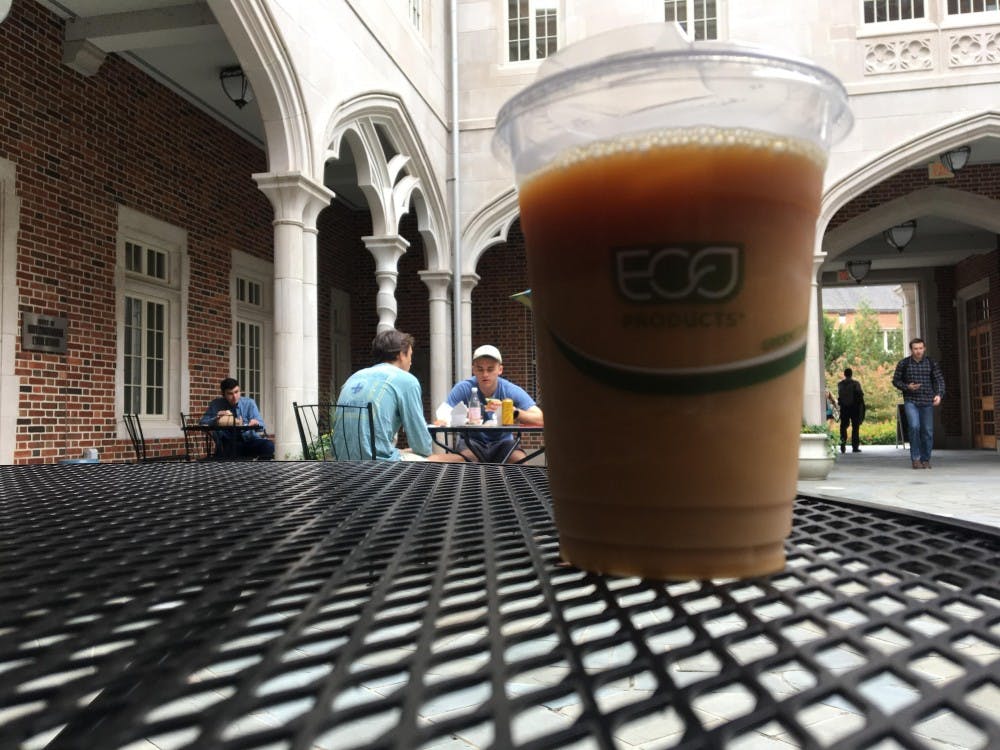Passport Café is phasing out plastic straws and offering strawless lids for cold drinks in an effort to make dining more sustainable on campus.
This decision came out of growing awareness of the effects plastic products have on the environment. This awareness quickly grew within the student body, and Passport Café began to hear student requests, Passport Café manager Karen Kourkoulis stated in an email.
“As manager of Passport Café since we opened in 2010, I have seen firsthand how food trends have evolved in retail dining,” Kourkolis stated. “Customers are looking for healthier food options, customization, and unique flavors/ingredients all under the umbrella of sustainability best practices.”
Students have noticed the change and provided positive feedback for the absence of straws.
“I think that they are an unnecessary waste of plastic,” said Valentina Zuluaga, a regular at Passport Café. “The first time I realized I wasn’t being given a straw, I thought they might be placed out somewhere, but when I saw that they had one of the cups that you could just drink out of, one of the lids, I just kind of rolled with it.”
There are few disadvantages to the straw-use reduction on campus, the only possible hindrance being the cost of strawless lids raising the price paid by customers. However, according to Kourkoulis, this slight shift in price has not caused business to die down.
“We found that customers are willing to pay a little more for products that improve the overall health of our planet,” Kourkoulis said.
However, straws are but one small player in the movement to making campus more sustainable.
“Straws are one of many single-use disposables that, taken collectively, are causing havoc in our landfills,” said Rob Andrejewski, director of the Office for Sustainability.
Andrejewski considers this movement to reduce the use of straws on campus as being a demonstrative one, rather than being environmentally impactful.
“I think you need to just think about single-use disposable plastics," Andrejewski said. "Straws have become the symbol for that. If we can get rid of straws, it will demonstrate our ability to follow through on a pretty difficult effort.”
Despite the seemingly small effect the reduction of straw use has on the overall wellness of the environment, Andrejewski still recommended opting out of straw use when possible. He also recommended making small changes, such as using reusable water bottles or using reusable shopping bags at the grocery store.
Enjoy what you're reading?
Signup for our newsletter
“If you engage in a way that is personally relevant, it’s going to have a longer lasting impact and not feel like a burden,” he said.
Through the Rethink Waste campaign, the Office for Sustainability is encouraging students to consider where disposable products go after they have been used. The Rethink Waste campaign is also encouraging more sustainable practices being carried out in dining services. Additionally, the Office for Sustainability is currently looking at the introduction of bioplastics and composting on campus at some point in the future, Andrejewski said.
Contact lifestyle writer Susanna Getis at susanna.getis@richmond.edu.
Support independent student media
You can make a tax-deductible donation by clicking the button below, which takes you to our secure PayPal account. The page is set up to receive contributions in whatever amount you designate. We look forward to using the money we raise to further our mission of providing honest and accurate information to students, faculty, staff, alumni and others in the general public.
Donate Now



